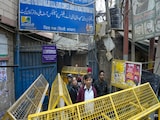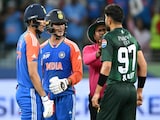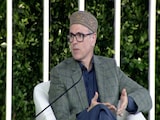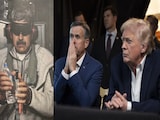Sri Lankan president Mahinda Rajapaksa.
Colombo:
Will the 2013 Commonwealth summit in Colombo be a test of the multilateral grouping's commitment to its core values of democracy, human rights and the eradication of poverty across all its member states?
As the CHOGM or Commonwealth Heads of Government Meeting gets underway today in the Sri Lankan capital, this question poses a major challenge to several world leaders in attendance, given the international furore over large-scale human rights violations against the island nation's Tamil population by the Sri Lankan government and armed forces; not only in the final days of the war against the LTTE in 2009, but also in the years since.
Rights activists accuse the government of being behind disappearances of Tamil civilians, harassment of journalists and also crucially, dragging its feet on fundamental promises made at the end of the war - more political freedom and a return of all the lands occupied by the Sri Lankan forces in the north and the east to its original residents who were forced out during the nearly three-decade long civil war.
A defiant Sri Lankan President Mahinda Rajapaksa has taken on his critics forcefully, and says he's "willing to talk to even terrorists" - referring to many in the Tamil Diaspora overseas. He dismissed charges of unprovoked killings, rapes of Tamil women by the army and the disappearance of journalists; calling them baseless, arguing that the LTTE used civilians as human shields during the war, and that "Sri Lanka at least has peace now." To prove his point, he's made hosting the CHOGM a massive moment of pride for his government with Colombo's spanking new highways and buffed, polished cityscape welcoming everyone to the summit.
Countries like Canada and Mauritius have openly boycotted the summit; in fact, Mauritius has also backed out of hosting the next one in 2015. International journalists also see Indian Prime Minister Dr Manmohan Singh's staying away as a boycott. But rejecting that notion, President Rajapakse said he was satisfied with the foreign minister Salman Khurshid's presence. The UK Prime minister David Cameron has argued that he is attending but only to engage with Colombo on the critical human rights issue, and push for an independent inquiry into the charges.
The president's political opponents in Sri Lanka are concerned that the summit could be construed as an endorsement of the government and its lack of will on investigating these charges, and devolving political powers to Tamils in the north and the east. After a meeting of the Tamil MPs from the Tamil National Alliance - am amalgamation of Tamil political parties - led by R Sambandhan met Indian foreign secretary Sujatha Singh to ask for India's intervention with the Government of Sri Lanka on this issue.
India has embarked on a massive housing project to build 50,000 homes for displaced Tamils, and building rail links connecting the predominantly Tamil north and the east of the country. India has also actively engaged on the need for more political autonomy and language and employment rights for the island nation's Tamil population.
For the 53-nation grouping - one many consider an irrelevant relic of colonialism, the controversy casts a great cloud on the meeting. Questioned on whether holding the meeting in Sri Lanka made a mockery of Commonwealth values, its general secretary, and former Indian diplomat Kamlesh Sharma defended the move saying the group was "working with the Sri Lankan government and institutions to pursue core values of the commonwealth charter- democracy, rule of law and judicial independence and strengthen guarantors of these."
It remains to be seen whether the communiques at the end of the summit will be able to take into the account some of these challenges.
As the CHOGM or Commonwealth Heads of Government Meeting gets underway today in the Sri Lankan capital, this question poses a major challenge to several world leaders in attendance, given the international furore over large-scale human rights violations against the island nation's Tamil population by the Sri Lankan government and armed forces; not only in the final days of the war against the LTTE in 2009, but also in the years since.
Rights activists accuse the government of being behind disappearances of Tamil civilians, harassment of journalists and also crucially, dragging its feet on fundamental promises made at the end of the war - more political freedom and a return of all the lands occupied by the Sri Lankan forces in the north and the east to its original residents who were forced out during the nearly three-decade long civil war.
A defiant Sri Lankan President Mahinda Rajapaksa has taken on his critics forcefully, and says he's "willing to talk to even terrorists" - referring to many in the Tamil Diaspora overseas. He dismissed charges of unprovoked killings, rapes of Tamil women by the army and the disappearance of journalists; calling them baseless, arguing that the LTTE used civilians as human shields during the war, and that "Sri Lanka at least has peace now." To prove his point, he's made hosting the CHOGM a massive moment of pride for his government with Colombo's spanking new highways and buffed, polished cityscape welcoming everyone to the summit.
Countries like Canada and Mauritius have openly boycotted the summit; in fact, Mauritius has also backed out of hosting the next one in 2015. International journalists also see Indian Prime Minister Dr Manmohan Singh's staying away as a boycott. But rejecting that notion, President Rajapakse said he was satisfied with the foreign minister Salman Khurshid's presence. The UK Prime minister David Cameron has argued that he is attending but only to engage with Colombo on the critical human rights issue, and push for an independent inquiry into the charges.
The president's political opponents in Sri Lanka are concerned that the summit could be construed as an endorsement of the government and its lack of will on investigating these charges, and devolving political powers to Tamils in the north and the east. After a meeting of the Tamil MPs from the Tamil National Alliance - am amalgamation of Tamil political parties - led by R Sambandhan met Indian foreign secretary Sujatha Singh to ask for India's intervention with the Government of Sri Lanka on this issue.
India has embarked on a massive housing project to build 50,000 homes for displaced Tamils, and building rail links connecting the predominantly Tamil north and the east of the country. India has also actively engaged on the need for more political autonomy and language and employment rights for the island nation's Tamil population.
For the 53-nation grouping - one many consider an irrelevant relic of colonialism, the controversy casts a great cloud on the meeting. Questioned on whether holding the meeting in Sri Lanka made a mockery of Commonwealth values, its general secretary, and former Indian diplomat Kamlesh Sharma defended the move saying the group was "working with the Sri Lankan government and institutions to pursue core values of the commonwealth charter- democracy, rule of law and judicial independence and strengthen guarantors of these."
It remains to be seen whether the communiques at the end of the summit will be able to take into the account some of these challenges.















